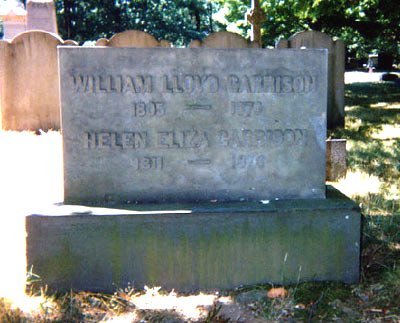William Lloyd Garrison

William Lloyd Garrison
William Lloyd Garrison was born in 1805. He spent his childhood in Newbury Port, Massachusetts. His mother, a strict Baptist, raised Garrison. His father was a sailor who deserted his family in 1808. Because of this, his family soon broke up. They were very poor and he soon became an apprentice to a printer at the age of thirteen. This was to be the beginning of his life in Journalism.
Garrison was always against slavery, but after meeting a Quaker by the name of Benjamin Lundy in 1828, he became an extreme abolitionist. Lundy was an anti-slavery propagandist and organizer, who owned a newspaper. Garrison would later be put in jail for seven months after launching attacks on slave dealers though Lundy's paper.

William Lloyd Garrison
In
1831, Garrison decided it was time to start publishing his own paper, which he named The Liberator. Though some
people wanted slavery to gradually disappear, Garrison wanted to take immediate action and make slavery disappear all at once. He stated such things in his paper and sometimes aroused violent public reaction.
By
1832, Garrison began influencing such people as Wendell Phillips, Theodore
Park, and Henry David Thoreau, when he formed the first society
for
the immediate abolition of slavery. Garrison also faught for the equal rights of woman through the American Anti-Slavery Society formed in 1833, which split from the abolitionist movement.
Garrisons opinions and beliefs, however, were not well received by all. In 1830, his writing caused a mob in Boston to attack him, endangering his life.
Garrison was also strongly
against
the South and any government that permitted slavery. He even believed the North should separate from the South, and as protest, he refused to vote in the presidential elections. He did, however, support Lincoln when he became President and continued to supported him throughout the Civil War.
When the 13th Amendment was added to the
Constitution and ended slavery in 1865, Garrison stopped publishing his newspaper and was content. Garrison had spent his entire life fighting against slavery and for equal rights. He helped to publicize the problem and made it known that it was wrong. He was an important voice in the abolition of slavery.

Here rest William Lloyd Garrison
Sources:
www.undergroundrailroad.org/history/william_garrison.html (online) visited December 18, 1999.
www.woldbook.com/fun/aajourny/html/bh044.html (online) visited December 17, 1999.
www.nps.gov/boaf/garris~1.htm (online) visited December 23, 1999.
Picture Credit:
Picture #1 - "William Lloyd Garrison" from: www.pbs.org/wgbh/aia/part4/4p1561.html
Picture #2 - "William Lloyd Garrison in The later years" from: www.nps.gov/boaf/garris~1.htm
Picture #3 . "Here rest William Lloyd Garrison" from: www.findagrave.com/pictures/384.html